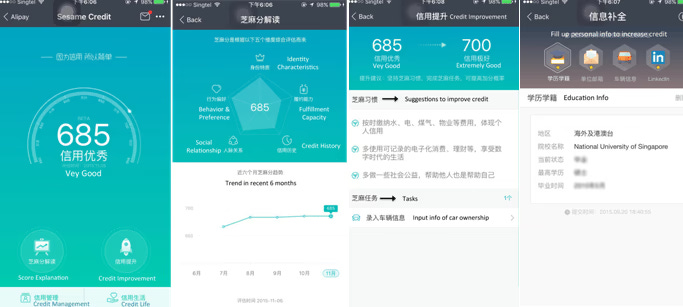The Truth About China’s So-Called “Social Credit System”
What Western media calls a digital dictatorship is mostly credit scores, court enforcement, and accountability
Every few months, Western media bring back the same story. “China is watching everyone.” “Citizens are scored for loyalty.” “People get banned for bad behavior.”
It sounds like Black Mirror. It also sounds fake.
The truth is simple. The all-seeing national “social credit” system the West describes does not exist. There is no app that ranks people as good or bad citizens. There is no single government database that controls every part of life. What China actually has are different systems — commercial, financial, and legal. Each does one specific job.
1. The Private Credit Systems
The best-known example is Zhima Credit, also called Sesame Credit, run by Alipay.
It’s not political. It’s financial.
It works like a FICO score in the United States.
If you pay your bills on time, return rentals, and honor contracts, your score rises.
If you miss payments or break agreements, it drops.
With a high score, you can skip deposits for hotels or rentals, get faster approvals, or better rates on small loans.
That’s all, it is a digital trust record inside a private payment app. It has nothing to do with the government judging your opinions.
WeChat has smaller versions of the same thing tied to WeChat Pay and loans. These systems track reliability in payments, not political loyalty.
2. The Real “Blacklist”
The only part that connects to government enforcement is the 失信人员名单, the Shixin Renyuan Mingdan, known in English as the Dishonest Persons List.
It’s not a political blacklist. It’s a court enforcement tool. It targets people who can pay court-ordered debts but refuse to do so.
Here’s how it works.
A man runs a construction company, finishes the job, gets paid, and vanishes without paying his workers. The court rules he must repay the wages. He ignores it and keeps spending on cars and vacations. The court adds him to the list.
A business owner hides his assets. He moves money to relatives’ names or fakes bankruptcy to avoid paying suppliers. He gets caught on the list.
Some people forge evidence, threaten court officers, or use fake lawsuits to block enforcement. They go on the list too.
Once listed, you lose access to luxury.
You cannot buy high-end property.
You cannot fly first class or stay in five-star hotels.
You cannot send your kids to elite private schools.
You cannot take premium seats on high-speed trains.
It’s about legal trust.
If you have money for luxury, you have money to pay your debts.
The same logic exists in the U.S., only weaker. People who skip child support or default on taxes can lose passports or have wages garnished. China’s system simply automates it.
3. Why Western Media Gets It Wrong
Because “China builds digital dictatorship” sells.
Fear sells. Nuance does not.
Meanwhile, Western corporations already run social credit systems of their own. Uber bans riders with low ratings. Banks freeze accounts without reason. Twitter, YouTube, and PayPal restrict users for behavior they dislike. But since these are private, people pretend it’s different.
4. The Western Double Standard
In China, if you refuse to pay debts, you lose access to luxury.
In the United States, when the rich default, they call it “business strategy.”
They bankrupt companies, ruin investors, fire workers, and walk away clean. Then they start new companies and do it again. The losses fall on the working class. The assets are protected behind legal walls and loopholes.
Trump is the perfect example. He defaulted on casinos, hotels, and even a fake university. He burned through investors’ money, ignored lawsuits, and still lives in gold towers, flies private, and runs for president.
If a worker misses a few credit card payments, their score collapses, their wage gets garnished, and they can’t rent an apartment. A billionaire bankrupts an empire and gets another loan.
So when Western media calls China’s blacklist “authoritarian,” remember this: China punishes financial dishonesty. America rewards it.
5. The Real Issue Is Power
China’s credit systems are about responsibility and enforcement. They make people honor agreements.
In the West, wealth buys freedom from consequence.
That’s why the myth of China’s “social credit system” exists; it distracts people from how power works at home.
It’s why Western elites never face judgment at all.


I think Zhu has a lot of insight, and that it is independent from his being a Chinese national, although the comparative examples are instructive. Particularly, I refer to his observation that wealthy people in the west seem seldom to suffer as a result of their serial malfeasances. In fact, they just get richer at the expense of those they exploit.
Always insightful but knowledge is critical for everyone, not just those who can pay to subscribe. In fact it may be more essential for those who cannot afford subscriptions.